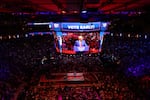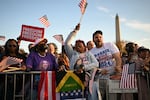
Republican presidential nominee, former U.S. President Donald Trump speaks at a campaign rally at Madison Square Garden on Oct. 27, 2024 in New York City.
Michael M. Santiago
An election betting advertisement flashed on screen during coverage of former President Donald Trump’s rally at Madison Square Garden this weekend on the Right Side Broadcasting Network, a conservative media company.
“Bet on the US election,” the ad for Kalshi said as Trump spoke on stage. “Bet $100 on Trump, Get $175.”
More than $100 million have been legally wagered on the presidential race on the platform, days out from Election Day. This explosion in legal betting comes after a federal appeals court earlier this month allowed KalshiEX LLC, an online-betting company, to open an election prediction market.
The company’s CEO, Tarek Mansour, told NPR his election market — which shows a 63% chance of Trump winning as of Tuesday — is a “mechanism for truth” and help regular people hedge against unpredictable political risk. But critics like Sen. Jeff Merkley (D-Ore.) have called the legal decision a “huge mistake” that harms American democracy.
Kalshi is still battling federal regulators in court. But retail investing platform Robinhood also started offering bets on election contracts this week. That leaves Americans free to make tens of millions of legal election bets, with little known about how they will impact one of the closest and most contentious presidential elections in decades.

Betting on U.S. Elections
Wagering on the U.S. presidential election is nothing new. Bets on presidential candidates were common during the turn of the 20th century. Betting commissioners in New York City controlled these markets at a place called the New York Curb Exchange.
Not only did bets occur, the markets were fairly accurate during a time before scientific political polls, according to NPR’s former gambling correspondent and current editor Keith Romer.
“Of the 15 presidential elections between 1884 and 1940, the betting market correctly calls the race in 11,” Romer told NPR’s Planet Money. “It’s too close to call in three. And they only get one wrong.”
Major papers, like The New York Times, would publish the betting odds as a source of information, Romer said. But in the latter half of the 20th century, during the advent of scientific polling and a number of prohibitive gambling laws, election betting fell out of favor.
In recent years, prediction markets have brought election betting back. On the social media platform X, the Trump campaign, tech billionaire Elon Musk and pollster Nate Silver often post the latest presidential betting odds on Polymarket, an offshore prediction market U.S. citizens can only use illegally.
To date, $2.5 billion has been bet on the presidential election on Polymarket, which also gives the former president a 66% chance of election victory. Suspicious activity has raised questions about the site’s accuracy: Blockchain researchers cited by Fortune say there’s evidence some one-third of the volume on Polymarket’s presidential betting market is artificial.
Kalshi for the first time gives Americans a legal platform for their wagers, which CEO and co-founder Mansour argued offers voters accurate information, in contrast to political polling.
Rajiv Sethi, a professor of economics at Barnard College who has been studying these markets for years, said the “jury is still out” on whether prediction markets are better than traditional political polling — but it’s close.
“They generate outputs that are actually quite competitive with the best models,” Sethi said.
Affecting election outcomes?
Mansour, the CEO, said the goal is to broaden election betting to the general public, similar to the creative financial vehicles that are available to hedge risks for “high-net-worth individuals” at investment banks like Goldman Sachs, his former employer.
He gave the example of an environmental company protecting itself against the election of a candidate who proposes slashing climate change initiatives.
“People can now do something about it,” Mansour said. “They can reduce their exposure and volatility towards events that they don’t really have control over.”
When asked about nefarious betting meant to falsely inflate the odds of a given candidate, Mansour said election markets are “self-correcting” because bettors will see an opportunity to make money on an inflated outcome.
“The only outcome is basically — the people who tried to manipulate in the first place lost a lot of money,” Mansour said during an interview conducted when the Kalshi odds mirrored those of public polls.
Mansour admitted election betting isn’t a zero-risk proposition, but said Kalshi is federally regulated — meaning regulators would be able to intervene if someone tried to manipulate a market.
“Everything is super transparent and everyone can see anything you do and know your name and your address and what you’re doing and the government is monitoring,” Mansour said. “It feels like a pretty bad place to try to do any of these things.”
Sethi, the Barnard professor, largely agreed, citing a 2012 case when an anonymous person bet $7 million to increase the odds of then-Republican presidential nominee Mitt Romney winning the election, and failed when other gamblers caught on. But Sethi said there still is a potential for manipulation.
“Your belief about whether a candidate is viable, is doing well, is likely to prevail, can affect things like fundraising, support, the enthusiasm, volunteer effort and so on,” Sethi said. “These things can actually affect the actual outcome of the election.”

Supporters of Vice President and Democratic presidential candidate Harris wait on The Ellipse just south of the White House for her speech in Washington, D.C., on Tuesday. More than<strong> </strong>$100 million have been legally wagered on the presidential race on the first legal election betting platform in the U.S. in years.
Andrew Caballero-Reynolds
‘A huge mistake’
One week from Election Day, the Kalshi market favors Trump by over 30 percentage points — while most political polls show Harris and Trump statistically tied. This misalignment has raised questions about the accuracy of these markets.
Merkley, the Oregon senator, has opposed Kalshi from the start and proposed a bill in Congress to ban all election betting.
“Allowing election betting is a huge mistake,” Merkley told NPR. “It turns elections from a place where you exercise your principles to where you exercise your pocketbook. It corrupts our American elections.”
Beyond the moral challenge, Merkley said the law prohibits it. He says it’s against Regulation 40.11 from the Commodity Futures Trading Commission, which prohibits trades on “terrorism, assassination, war, gaming, or an activity that is unlawful under any State or Federal law.” The CFTC is fighting Kalshi in court.
“Gaming is betting on the outcome of a contest,” Merkley said. “An election is a contest. These are not commodities. This is not oil. This is not silver.”
Kalshi’s Mansour said he knows election betting comes with a stigma of corruption, but argued the critique doesn’t hold water.
“We fought for these markets not because we think they threaten election integrity,” Mansour said. “On the contrary, we think they promote it.”